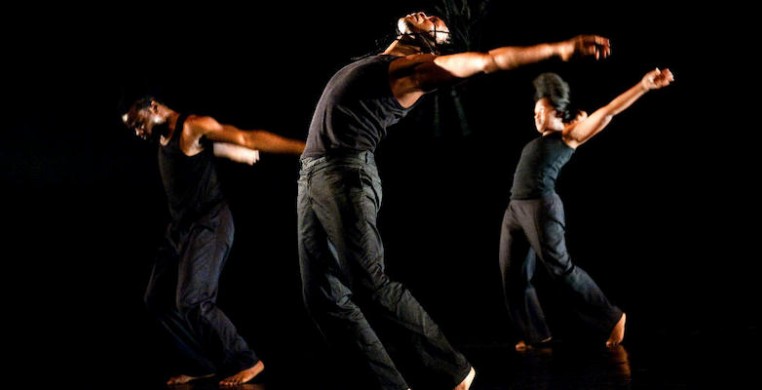What is self-identity? Is self-identity synonymous with humanity? Perhaps the two have a relationship in which self-identity defines one's humanity and humanity influences one's self worth. Either way, Adedayo Liadi, founder of Lagos-based Ijodee Dance Company, searches for the answers to these questions in “Aye Asan (Vanity).” Ijodee, performing alongside Durban's Flatfoot Dance Company, presented this work as part of the digital ‘Legacy’ platform hosted by JOMBA! Contemporary Dance Experience.
Six performers— Frank Konwea, Sifiso Khumalo, Jabu Siphika, S’fiso Magesh Ngcobo, ‘Teekay’ Quvane and Mlondolozi Zondi— played out the cycle of birth, death and rebirth on my computer screen. As the lights faded in, the dancers looked like convulsing, amorphous beings spaced randomly on stage. Flesh colored unitards and bike shorts reflected under warm lights as ambient music echoed a state of being that lacked consciousness. It felt pre-evolutionary—this group of homosapiens seemingly devoid of their limbs.
What looked like microorganisms shape-shifted into pedestrians. They stood up, walked around, talked to one another and laughed together. Sounds of a typewriter drowned out their voices. But as the mood changed, so did the atmosphere on stage. It became a social space—presumably a club or a bar—where people drink, smoke and dance with one another. Evocative of today’s society, the dancers evolved from the unthinking beings they used to be, yet they remained devoid of compassion. A visceral enactment of a man raping a woman, ignored by everyone else in the space, brought about an unsettling air of familiarity—a sour taste hit my mouth as I was reminded, without warning, of a night too many women have experienced and would rather forget.
As the performance continued, I felt stuck in that isolated moment for longer than I would like to admit. I digested flashes of costume changes and unison dancing, yet it wasn’t until the stage was too dimly lit to identify the dancers that I was drawn back in. A person wheeled across the stage on a large slab of wood played a horizontal cello. It felt ominous, mysterious. The striking image brought me out of the previous distraction.
“Aye Asan” exposes the dark side of human nature, but the ending showed remnants of hope. The sextet of dancers stripped themselves back down to the flesh-toned unitards, repeating the opening convulsions again. There was power in this restart. It felt different—changed by the past—signaling the possibility of a future to come.
--
This piece was produced as part of the inaugural See Chicago Dance Critical Writing Fellowship, in partnership with JOMBA! Contemporary Dance Experience and the University of KwaZulu-Natal (Durban, South Africa), the University of the Witwatersrand and The Ar(t)chive (Johannesburg, South Africa) and the University of East London (London, UK). Financial support is provided by the U.S. Consulate in Durban, the National Endowment for the Arts and the Chicago Department of Cultural Affairs and Special Events.

Fellow Emma Elsmo began her formal dance training at the Academy of Movement and Music in Oak Park, Illinois. In May 2019 she graduated from Temple University with a Bachelors of Fine Arts concentrated in dance performance and choreography. She relocated back to Chicago in Fall 2019 and currently enjoys working as Deeply Rooted Dance Theater’s individual giving manager, reviewing performances for See Chicago Dance, and dancing whenever and wherever she can. She’s looking forward to participating in the first Critical Writing Fellowship.

